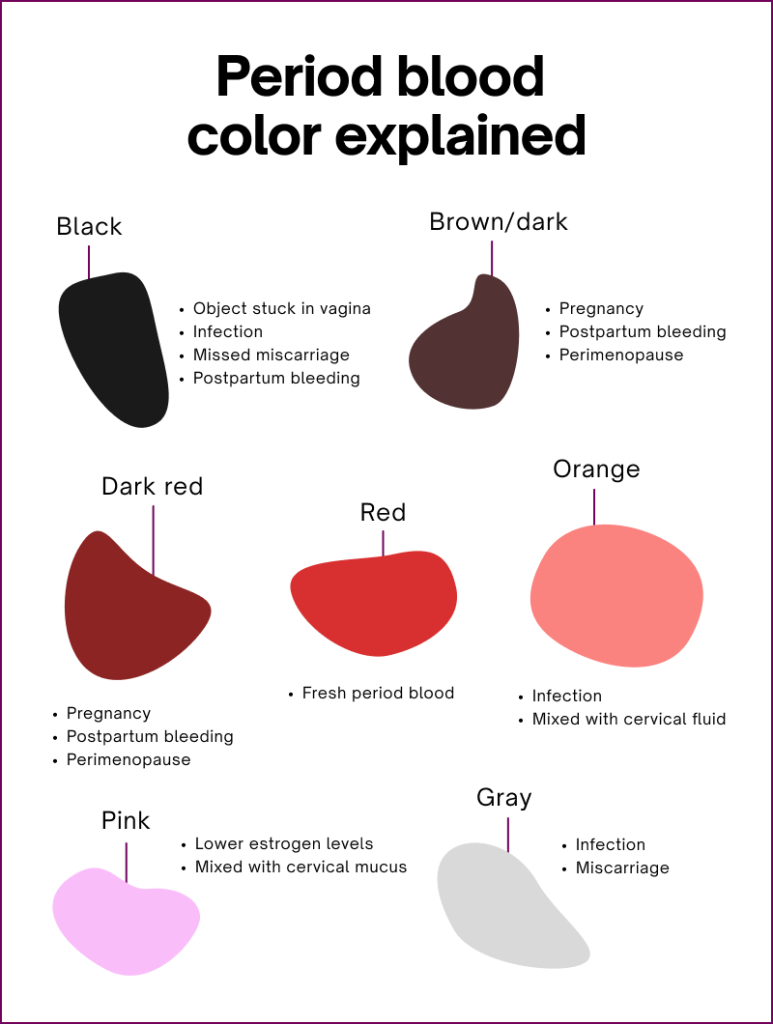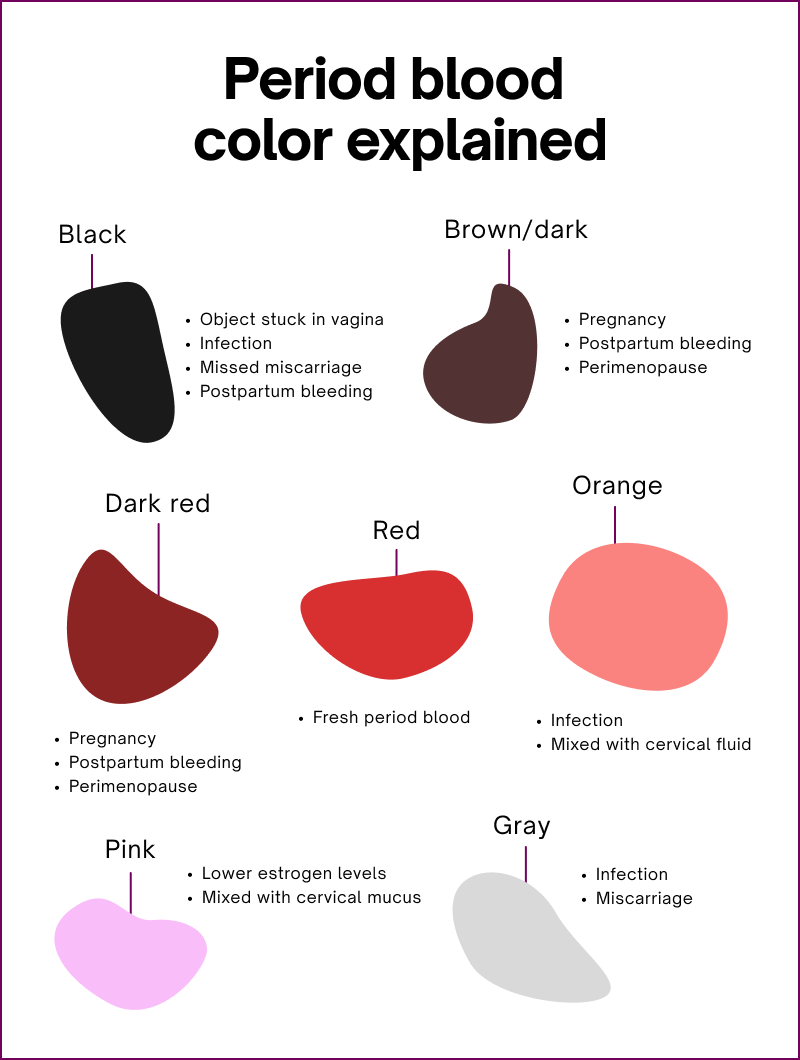Media Health Group’s sole mission is to give medically empowered and knowledge packed information to people that really need them. We are very big on giving the best support and information for sensitive topics like menstrual health and also support girls that need more guidance and are confused about where to look for advice.
If you’ve ever found yourself wondering and thinking why your period blood is black then know that it is not such a strange question to ask yourself. At one point in life so many girls have noticed some changes in the color of the menstrual blood. Though it is a bit scary to see black blood while you’re menstruating, it doesn’t always necessarily mean that there’s a problem. It can just be a normal occurrence that happens during your menstrual cycle.
In the course of this article, we will help explain the different causes of period blood being black, the differences between all the period blood colors, the cases where you should be alarmed and when to seek medical help. In addition we provide frequently asked questions and help to dispel some random myths about menstruation.
In order to ease your worries, we would like you to know that black period blood is usually old blood that wastes time in exiting the uterus and gets oxidized during that waste of time. When your blood gets exposed to air, it gets dark. Imagine a situation where you have a cut on your arm and it becomes a scab and darkens over time, that is exactly how it works for period blood. Note that this is hundred percent harmless and mostly a part of how your menstrual cycle is meant to go.

There are a lot of causes of black period blood, but here are some popular reasons why your blood might look black during period:
- You might see it when there is old blood leaving your uterus. There is usually an appearance of black blood at the start or finish of your period, especially when you have a light blood flow. Your blood tends to stay longer in the uterus and can get black because of oxidation.
- Black or brown vaginal discharge can be caused by some sexually transmitted infections (STIs) or even bacterial infections. This can also be followed by burning, itching or even a foul odor.
- It can also be due to low blood flow or spotting. Your blood might take a lot of time to leave your body if you experience a case of light menstrual flow or spotting. Due to this, your blood might have a black or brown color.
- If you had a missed miscarriage, that might cause either black bleeding or even old blood, and this comes hand in hand with some symptoms like back pain, cramps, and tissues in your blood.
- It can also be due to lochia, which is also known as postpartum bleeding. Normally after giving birth, some women might go through lochia, which is simply a combination of mucus, blood and uterine tissue. In the first few days of your postpartum, you might see this discharge which is usually black or dark red.
- Obstructed menstrual flow is also a common cause. Some conditions like cervical stenosis which is known as the narrowing of the cervix or even foreign objects like tampons that were forgotten can obstruct menstrual flow and thereby cause it to look black and smell bad.
- Implantation bleeding can also cause this. Most times if you have a case of implantation bleeding, it can make your blood appear black especially if the blood is old. Well, you should know that this is not really as common as you think and might happen a few days before you are expecting your period.
Though period blood being black is normally not a cause for worry, there are sometimes when it might require a health check up because it might be serious. It is necessary to get medical check up if you see the following:
- There is a bad smell from the black period blood.
- The discharge comes with chills and fever
- Pelvic discomfort or painful menstrual cramps
- Missing a period and probability of pregnancy
- Burning or itching sensation
- Irregular bleeding during your period
In order to monitor the black period blood and know when it is normal, it is advisable to monitor your menstrual cycle because this can help you note down patterns and help you to point out things that are abnormal at the early stage. Firstly start by:
- Using a tracker app for your periods. It is very important to monitor the number, color and flow of your period every month.
- It is also important to have good personal hygiene. Remember to always change your pads or your tampons routinely in order to steer clear of infections.
- Pay close attention to any other symptoms that might occur as this can help with management. In the case where you might be having pain, fever or even a bad odor, it can help indicate that there might be underlying infections or other serious issues.
- If the black period blood keeps happening over different cycles or is followed with pain, it is then advisable to consult your gynecologist
Myth 1: Black period blood is definitely a sign that you are pregnant or you have miscarried
Truth: This just means that your blood is old and has probably oxidized.
Myth 2: Poor menstrual or personal hygiene can cause this
Truth: The different colors during your menstruation can be caused by either oxidation, the speed of your flow or even underlying health issues and not necessarily your hygiene.
Myth 3: Experiencing black blood is rare and can be abnormal
Truth: Experiencing black blood is pretty common, especially when you’re starting or finishing your period.
In the case where you see thick, black blood, this can mean that your blood has been combined with uterine lining. Note that this is very common and it is not a cause for worry.
Yes, it is possible for stress to cause black blood because it might delay your cycle which causes blood to stay in the uterus for a longer period of time and might ultimately create a dark or black colored blood.
Not in all cases. Though endometriosis might affect the patterns in your blood, seeing black blood by itself is not an actual sign. It is advisable to see your doctor in order to get diagnosed properly.
If you notice dark or black spotting during the early stages of your pregnancy, that might signify implantation bleeding or even a miscarriage. Please reach out to your doctor immediately for a proper check up.
Yes. If you have a bad odor, it always means that there is either an infection or a strange object like a forgotten tampon in your vagina. You need to get checked by a medical practitioner.
It is understandable that experiencing black period blood can be discomforting, but in a lot of cases, it is just a normal occurrence during the menstrual cycle, especially at the start or finish of your period. But in the case where it is followed by odor, pain or symptoms that are considered abnormal, it might imply that there is something serious like a miscarriage, infection or even an obstruction.
It is very vital to understand your menstrual cycle and your body in order to maintain your reproductive health. Always conduct frequent check ups with your healthcare professional, have informative discussions about menstrual health and have it in mind that the right information can help you to take care of yourself properly.
